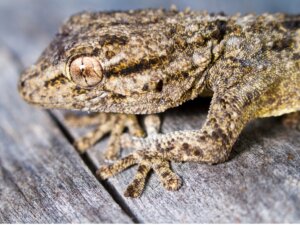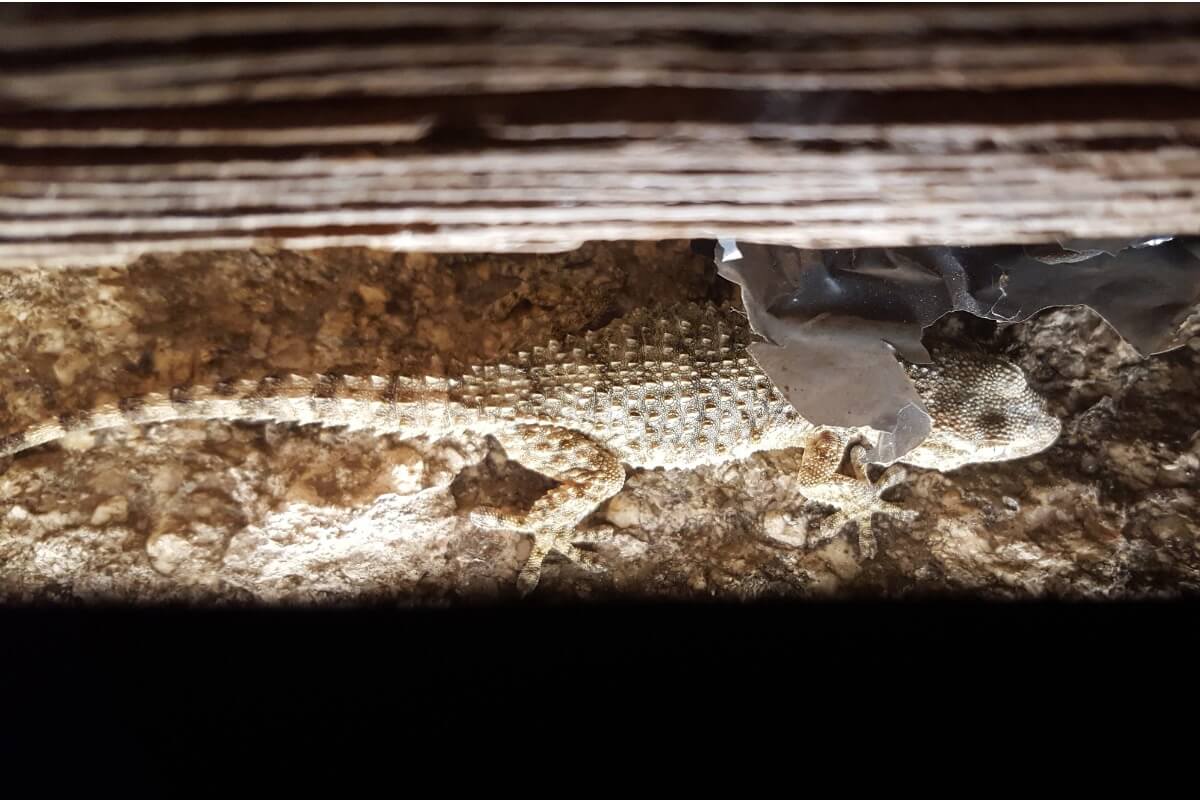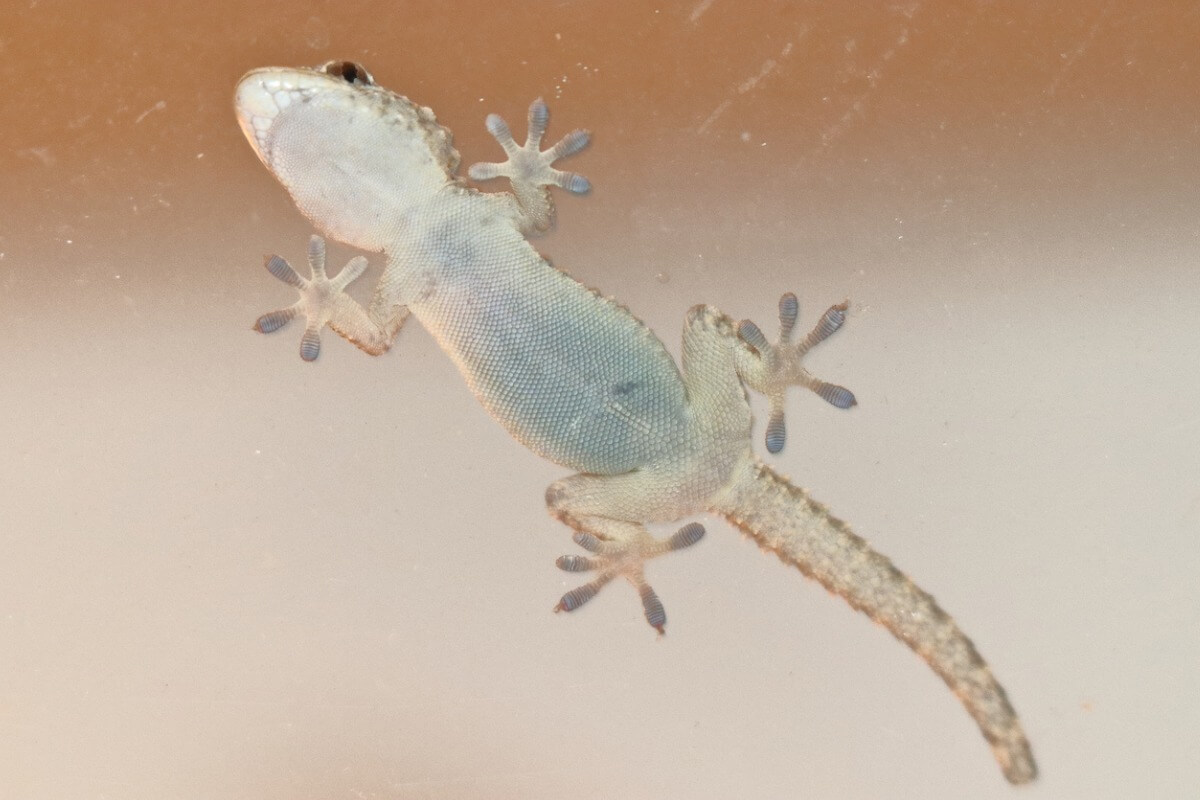Are Geckos Poisonous?


Written and verified by the biologist Francisco Morata Carramolino
Common geckos can be seen easily in urban settings, especially during warm summer nights. As with many other animals, this closeness to humans has generated a whole series of myths and misconceptions about geckos, such as the belief that they are poisonous.
These beliefs, without any basis in reality, cause a feeling of rejection against these small reptiles. Despite this, geckos aren’t capable to cause any harm to people and, in fact, their presence is usually quite beneficial for humans. Keep reading if you want to know more.
Characteristics of geckos
The common gecko (Tarentola mauritanica ) is one of the two geckos that inhabit the Iberian Peninsula. The other is the pink gecko (Hemidactylus turcicus), similar to the common one, but not as frequently seen.
The common gecko can reach 19 centimeters (7.5 inches) from head to tail, although most individuals are smaller. Its entire body is flattened dorsoventrally and covered with tiny scales. In addition, it has rows of larger tubercles throughout the dorsal surface.
The coloration is variable and contains grayish, brown, blackish, or cream tones. The overall hue is usually darker during the day and lighter at night. On the contrary, the belly is very pale, almost translucent.
These animals have a broad head that has 2 prominent eyes with a vertical pupil. The five toes of each leg are a similar length. They’re flattened at the tip, with adhesive strips that allow the animal to climb on a multitude of surfaces.

The tail measures close to the length of the body. Geckos can shed it through a mechanism called autotomy, to escape predators. The tail grows back after a while, but never returns to its original appearance. In addition, the animal is more vulnerable during this time.
Regarding their habitat, these small reptiles are anthropophilic. Although they also inhabit natural environments, they prefer landscapes modified by the urban presence, with walls or facades. They’re active throughout the day, but have a significant foraging peak at night.
Are geckos poisonous?
No, geckos aren’t poisonous. There are some species of lizard that do have venom, but all of them belong to the Toxicofera family. In contrast, geckos don’t produce any harmful substances.
These reptiles aren’t aggressive at all. In the face of any threat, their first reaction is to flee and hide in a crevice or under a stone.
Even if one of these animals were to bite a person, it should be noted that geckos have very little jaw strength and their teeth are very small. A bite from a specimen of this species isn’t capable of breaking human skin.
On the other hand, a gecko will only try to bite if it’s caught, in order to defend itself. This shouldn’t be done in the first place, as it stresses the animal and can cause them a lot of harm.
Myths and realities
There are many other myths about these animals. Some maintain that they’re capable of spitting and rendering their target blind or bald. It is also speculated that they can enter through the body orifices and eat the organs from within or that they have healing properties. Of course, none of these statements is true.
Geckos are absolutely harmless to humans. Not only this, but they’re also very beneficial. These urban geckos are voracious predators of invertebrates of all kinds.
Their diet includes cockroaches, spiders, ants, mosquitoes, flies, moths, and many other arthropods. Therefore, geckos are very valuable allies, keeping populations of nuisance insects that can enter homes at bay.
What to do if there’s a gecko in your house?
Geckos live near or in houses. Therefore, it’s normal that some end up sneaking inside through a window or door. Especially in hot regions, this event is very common.
As has already been established, geckos aren’t poisonous. They don’t cause any harm and they feed on invertebrates. In addition, they’re very discreet and silent. Their presence in the home can be favorable, so if you do find a gecko, one option is to simply let it be.
If you want to expel the reptile from your home for any other reason, leaving a window open near where it was found is sufficient. The gecko will end up looking for food when it isn’t threatened.
Another option is to do it manually, although it’s less recommended in case the animal is harmed. If you opt for the latter, you should always act calmly and with great care. The gecko’s tail should never be touched. Neither should you tighten its belly, which is very soft, as it could damage the internal organs.
A jar can be used to catch and transport the animal. Once out of the house, it’s highly recommended to release it near a crevice or hole where it can take refuge.

In conclusion, it should be remembered how harmless these small reptiles are. They never try to attack human beings, they feed on insects, and brighten up summer nights by running around our walls. As with any other living being, we must try to understand and respect geckos.
Common geckos can be seen easily in urban settings, especially during warm summer nights. As with many other animals, this closeness to humans has generated a whole series of myths and misconceptions about geckos, such as the belief that they are poisonous.
These beliefs, without any basis in reality, cause a feeling of rejection against these small reptiles. Despite this, geckos aren’t capable to cause any harm to people and, in fact, their presence is usually quite beneficial for humans. Keep reading if you want to know more.
Characteristics of geckos
The common gecko (Tarentola mauritanica ) is one of the two geckos that inhabit the Iberian Peninsula. The other is the pink gecko (Hemidactylus turcicus), similar to the common one, but not as frequently seen.
The common gecko can reach 19 centimeters (7.5 inches) from head to tail, although most individuals are smaller. Its entire body is flattened dorsoventrally and covered with tiny scales. In addition, it has rows of larger tubercles throughout the dorsal surface.
The coloration is variable and contains grayish, brown, blackish, or cream tones. The overall hue is usually darker during the day and lighter at night. On the contrary, the belly is very pale, almost translucent.
These animals have a broad head that has 2 prominent eyes with a vertical pupil. The five toes of each leg are a similar length. They’re flattened at the tip, with adhesive strips that allow the animal to climb on a multitude of surfaces.

The tail measures close to the length of the body. Geckos can shed it through a mechanism called autotomy, to escape predators. The tail grows back after a while, but never returns to its original appearance. In addition, the animal is more vulnerable during this time.
Regarding their habitat, these small reptiles are anthropophilic. Although they also inhabit natural environments, they prefer landscapes modified by the urban presence, with walls or facades. They’re active throughout the day, but have a significant foraging peak at night.
Are geckos poisonous?
No, geckos aren’t poisonous. There are some species of lizard that do have venom, but all of them belong to the Toxicofera family. In contrast, geckos don’t produce any harmful substances.
These reptiles aren’t aggressive at all. In the face of any threat, their first reaction is to flee and hide in a crevice or under a stone.
Even if one of these animals were to bite a person, it should be noted that geckos have very little jaw strength and their teeth are very small. A bite from a specimen of this species isn’t capable of breaking human skin.
On the other hand, a gecko will only try to bite if it’s caught, in order to defend itself. This shouldn’t be done in the first place, as it stresses the animal and can cause them a lot of harm.
Myths and realities
There are many other myths about these animals. Some maintain that they’re capable of spitting and rendering their target blind or bald. It is also speculated that they can enter through the body orifices and eat the organs from within or that they have healing properties. Of course, none of these statements is true.
Geckos are absolutely harmless to humans. Not only this, but they’re also very beneficial. These urban geckos are voracious predators of invertebrates of all kinds.
Their diet includes cockroaches, spiders, ants, mosquitoes, flies, moths, and many other arthropods. Therefore, geckos are very valuable allies, keeping populations of nuisance insects that can enter homes at bay.
What to do if there’s a gecko in your house?
Geckos live near or in houses. Therefore, it’s normal that some end up sneaking inside through a window or door. Especially in hot regions, this event is very common.
As has already been established, geckos aren’t poisonous. They don’t cause any harm and they feed on invertebrates. In addition, they’re very discreet and silent. Their presence in the home can be favorable, so if you do find a gecko, one option is to simply let it be.
If you want to expel the reptile from your home for any other reason, leaving a window open near where it was found is sufficient. The gecko will end up looking for food when it isn’t threatened.
Another option is to do it manually, although it’s less recommended in case the animal is harmed. If you opt for the latter, you should always act calmly and with great care. The gecko’s tail should never be touched. Neither should you tighten its belly, which is very soft, as it could damage the internal organs.
A jar can be used to catch and transport the animal. Once out of the house, it’s highly recommended to release it near a crevice or hole where it can take refuge.

In conclusion, it should be remembered how harmless these small reptiles are. They never try to attack human beings, they feed on insects, and brighten up summer nights by running around our walls. As with any other living being, we must try to understand and respect geckos.
All cited sources were thoroughly reviewed by our team to ensure their quality, reliability, currency, and validity. The bibliography of this article was considered reliable and of academic or scientific accuracy.
-
Salvador, A. 2016. Salamanquesa común – Tarentola mauritanica. En: Enciclopedia Virtual de los Vertebrados Españoles. Salvador, A., Marco, A. (Eds.). Museo Nacional de Ciencias Naturales, Madrid. http://www.vertebradosibericos.org/
- Fry, B. G., Vidal, N., Norman, J. A., Vonk, F. J., Scheib, H., Ramjan, S. R., … & Kochva, E. 2006. Early evolution of the venom system in lizards and snakes. Nature, 439: 584-588.
- https://macroinstantes.blogspot.com/2010/01/salamanquesas-mitos-leyendas-y.html
This text is provided for informational purposes only and does not replace consultation with a professional. If in doubt, consult your specialist.








